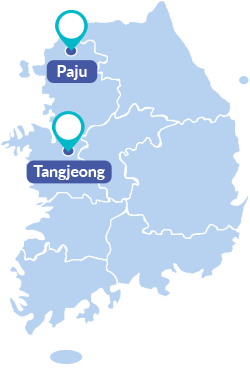
Home to the world’s largest display manufacturer, Korea has
long been the driving force of
the display industry. Even as
the global display market is experiencing
rapid changes, Korea has maintained its
top position by successfully shifting its
focus from LCD to OLED. As a result,
the country’s market share currently
accounts for over 95 percent of the
emerging OLED market.
Healthy competition and massive
investments are attributed to Korea’s success in the industry. The competition
between LG Display and Samsung
Display, two of the world’s largest display manufactures, accelerated the development of technology and the growth of
the industry in Korea. Most notably, in a
bid to attract foreign investment, the two
companies have established display
industrial complexes in Paju and
Tangjeong, respectively.
The Paju Display Industrial Complex is
located in the province of Gyeonggi-do.
The sprawling complex provides numerous
benefits and incentives for the 80 display-related companies,
including LG
Display. Due to its proximity to the country’s
capital, the complex boasts a highly
talented workforce. In addition, resident
companies have quick access to a variety
of export routes, including major ports
like Incheon Port. Gimpo International
Airport, most notably, is located within a
50km distance from the complex and
National Highway 1 is only a few minutes away.
The complex currently exports over 90
percent of its products, and to make
things easier for companies, the
Uijeongbu branch office of the Korea
Customs Service is located within the
region. This ultimately reduces the logistics time needed for customs clearance. In
particular, the Paju Dangdong Foreign
Investment Zone, a high-tech industrial
complex exclusively for foreigners, is
located in close proximity to the industrial
complex.
Thanks to investments from LG and
business-friendly government policies
and incentives, the Paju Display Industrial
Complex is flourishing. This year, LG
Display has unveiled its plans to invest
KRW 10 trillion (USD 8.75 billion)
mainly on building new plants. The local
government also offers support that
encourages further development. For
example, Gyeonggi-do offers financial
support for small and medium businesses,
ranging from KRW 200 million (USD
175,000) to KRW 1 billion (USD
875,000) per business. Resident companies
can also get a 50 percent property tax
exemption for five years.
To the south of the capital is the
Tangjeong Industrial Complex, spear-headed by Samsung Display. As one of
the leading display manufacturing clusters, the complex is responsible for 54
percent of Korea’s display products,
accounting for 27 percent of the total
global display production output.
Within the complex, about 210 resident
companies cooperate and collaborate to
produce high-tech display parts, materials
and finished goods. The Tangjeong
Industrial Complex provides plenty of
benefits and incentives. Since the 1980s,
the local government has supported the
complex by constructing the display support center and opening 35 universities in
the area to strengthen
 research and development.
research and development.
Samsung Electronics is also actively
investing in the complex, building
Samsung Display headquarters, the
Samsung SDI Cheonan Factory and the
Samsung Display Asan Factory. A new
production line is set to be constructed
and the project is speculated to be worth
KRW 16 trillion (USD 14 billion).
Similar to Paju, the complex offers 50
percent tax exemption for property tax
and composite land tax for five years
from the first day of acquisition. Financial
support is provided for small businesses
and startups in various forms, including
the Innovation Fund, Corporate
Rehabilitation Fund and the Management
Stabilization Fund. With such spectacular
infrastructure and substantial investments,
the Tangjeong Industrial Complex is
securing its foothold as the world’s pro
ducer of high-quality displays.